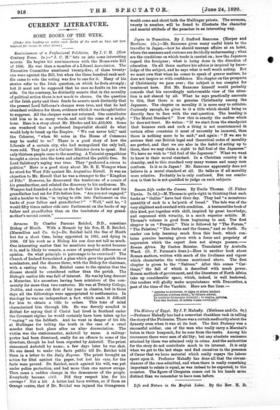Sermons. By Charles Parsons Reichel, D.D., sometime Bishop of Meath.
With a Memoir by his Son, H. R. Reichel. (Macmillan and Co. 6s.)—Dr. Reichel held the See of Meath but for a short time, being appointed in 1885, and dying in 1894. Of his work as a Bishop his son does not tell us much. One interesting matter that he mentions may be noted because it is, and is likely to remain, a cause of perpetual differences of opinion. On what principle is patronage to be exercised? The Church of Ireland formulated a plan which gave the parish three nominators, and the diocese three, with the Bishop for chairman, with a casting vote. Dr. Reichel came to the opinion that the diocese should be considered rather than the parish. The Bishop's earlier life was full of interest. He was by long descent a Moravian, his ancestors having been ministers of the com- munity for more than two centuries. He was at Trinity College, Dublin, and came out first of his year in classics, but in those days all the fellowships were appropriated to mathematics. In theology he was an independent, a fact which made it difficult for him to obtain a title to orders. This tone of mind characterised him through life. He was fiercely assailed in Belfast for saying that if Christ had lived in Scotland under the Covenant regime he would certainly have been taken up for " raging" on the Sabbath. And he went in danger of his life at Mullingar for telling the truth in the case of a cruel murder that took place after an altar denunciation. The victim was the stationmaster, Anketell by name. A railway- porter had been dismissed, really for an offence to some of the directors, though he had been reported by Anketell. The priest denounced Anketell by name ; a few days later he was shot. No one dared to make the facts public till Dr. Reichel told them in a letter to the Daily Express. The priest brought an action for libel against the paper, but lost his case, for the facts were proved. Dr. Reichel, much against his will, was put under police protection, and had more than one narrow escape. Then came a sudden change in the demeanour of the people.
Everybody became civil. Did they respect him for his courage ? Not a bit. A letter had been written, as if from an Orange centre, that if Dr. Reichel was injured the Orangemen would come and shoot both the Mullingar priests. The sermons, twenty in number, will be found to illustrate the character and mental attitude of the preacher in an interesting way.


















































 Previous page
Previous page